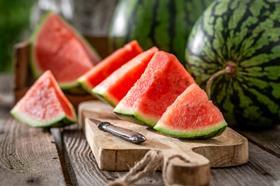
A review of scientific research into watermelons suggests eating the fruit is not just good for your heart and guts - it helps keep you trim too, reports the US National Watermelon Promotion Board.
A paper by Dr Britt Burton-Freeman and colleagues from the Illinois Institute of Technology, published in the journal Current Atherosclerosis Reports, cites evidence that watermelon intake and citrulline supplementation lower blood pressure in human trials, the board announced yesterday (25 January).
Favourable effects on lipids/lipoprotein metabolism are also emerging based on the data reviewed and reported in preclinical models, the report authors found.
According to the research, watermelon contains essential vitamins, minerals, antioxidants and amino acids. It also contains the amino acids citrulline and arginine, which both act as a precursor to nitric oxide, a molecule that plays a role in blood pressure regulation, lipid reduction and glucose control. Polyphenols and carotenoids, particularly lycopene, are also abundant in watermelon.
The nitric oxide benefits of citrulline and arginine coupled with the bioactivity of polyphenols and carotenoids found in watermelon suggests that this fruit may support normal cardio-metabolic health.
Burton-Freeman and colleagues reviewed the preclinical and clinical trial evidence published from 2000 to 2020 to assess watermelon intake and citrulline (a signature compound found in watermelon) on cardiovascular and metabolic outcomes, and to identify future directions important for establishing dietary guidance and recommendations.
They explored studies related to the whole fruit as well as citrulline supplementation, focusing on key cardio-metabolic risk factors. More research is needed to confirm findings of the studies identified in this literature review.
The investigators concluded that watermelon provides a combination of nutrients and phytochemicals working across multiple mechanisms to induce biological effects. Citrulline and arginine are central to these cardio-metabolic effects, and polyphenols, lycopene, potassium and magnesium contribute as well.
They said continued research is needed to determine the level of sufficient intake for clinical outcomes and will also need to be studied in a variety of populations. Research on the whole fruit and its products (i.e., juice) is also needed to help determine the level of sufficient intake.
The research identified additional potential benefits from watermelon consumption that warrant further research, such as body weight control (possibly through satiety mechanisms), glucose control, and brain and gut health.



